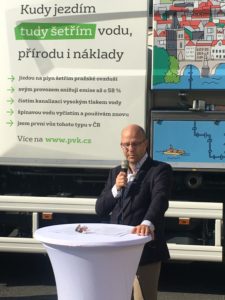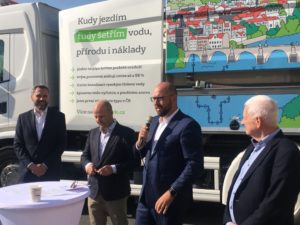- Hans Weber
- December 21, 2025
Prague must reduce its dependence on Russian gas and strengthen its energy self-sufficiency


April 27, 2022
Reducing energy dependence on oil and gas supplies from Russia is becoming a security necessity and a political priority for the capital. The price of natural gas has risen by 170% in the last year and it is necessary to count further, when the availability of natural gas in Europe will fall sharply in the near future and the price of imported gas will rise dramatically. The capital city of Prague therefore wants to accelerate the city’s main energy self-sufficiency projects. In Prague, natural gas is used mainly for heating. It consumes approximately one hundred and eighty thousand households and tens of thousands of other customers from institutions and companies. The capital itself consumes about one tenth of the total natural gas consumption in the Czech Republic for heating buildings. The capital city of Prague wants this level of dependence, especially on Russian gas, in the coming period by adopting a number of specific measures, some of which are already in the preparatory or even implementation phase. “Increasing energy security by emphasizing energy self-sufficiency is becoming an absolute political priority for us in the light of Russia’s actions in Ukraine. That is why I have commissioned a working group on climate change to prepare an update of the Prague City Climate Plan for 2030 in order to assess how to further reduce the future role of natural gas in meeting the energy needs of the metropolis and its inhabitants in order to reduce Prague’s dependence on Russian natural gas. “Says Deputy Mayor Petr Hlubuček. “We want to install efficient alternative sources as a substitute for natural gas in these systems. The first concrete step is to start preparations for the construction of the ENERGOCENTER, which uses wastewater from the Central Wastewater Treatment Plant in Bubeneč. With the help of a series of large-capacity heat pumps, the Energy Center will first obtain heat energy for supply to the neighboring localities of Dejvice and Veleslavín and in the second stage to the locality of Holešovice and the Bubny-Zátory development area, ”explains Deputy Mayor Hlubuček.
Snížení energetické závislosti na dodávkách ropy a plynu z Ruska se stává bezpečnostní nutností a politickou prioritou hlavního města. Cena zemního plynu vzrostla v posledním roce o 170 % a je nutné počítat dále, kdy dostupnost zemního plynu v Evropě v blízké budoucnosti výrazně poklesne a cena dováženého z palněného plynu dramaticky poroste. Hlavní město Praha chce proto urychlit projekty hlavní energetickou soběstačnost města. V Praze je zemní plyn využívání zejména k vytápění. Odebírá její přibližně sto osmdesáti tisíc domácností a další desítky tisíc odběratelů z řad institucí a firem. Samo hlavní město spotřebovává pro vytápění budov zhruba jednu desetinu celkové spotřeby zemního plynu v ČR. Tuto míru závislosti zejména na ruském plynu chce hlavní město Praha v následujícím období přijetím řady konkrétních opatření, z nichž některá jsou již v přípravné, nebo dokonce realizační fázi. „Zvýšení energetické bezpečnosti důrazem na energetickou soběstačnost se ve světle počínání Ruska na Ukrajině stává pro nás absolutní politickou prioritou. Proto jsem zadal pracovní skupinu pro klimatickou změnu, aby připravil aktualizaci Klimatického plánu hlavního města Prahy do roku 2030 s cílem posoudit, jak dále omezovat budoucí roli zemského plynu v krytí energetických potřeb metropole a jejích obyvatel s cílem snížit závislost Prahy na dodávkách ruského zemního plynu, “ říká náměstek primátora Petra Hlubučka. „Chceme nainstalovat účinné alternativní zdroje jako náhradu za zemní plyn v těchto soustavách. Prvním konkrétním krokem je zahájení přípravy výstavby ENERGOCENTRA, využívajícího odpadní vody z Ústřední čistírny odpadních vod v Bubenči. Energocentrum bude za pomoci série velkokapacitních tepelných čerpadel nejprve získávat tepelnou energii pro dodávku do zde sousedících lokalit Dejvic a Veleslavína a v druhé etapě do lokality Holešovice a do rozvojového území Bubny-Zátory,“ vysvětluje náměstek primátora Hlubuček.ENERGOCENTRUM will be the largest heat and cold production plant in the Czech Republic based on heat pumps. Heat supplies from large-capacity heat pumps are planned within a few years and the heat pumps themselves will be powered by electricity from renewable sources. The capital also wants to obtain its own gas resources, which will increase Prague’s energy self-sufficiency. “We have already pushed for the production of biomethane in the Central Wastewater Treatment Plant, while the first stage will be put into operation this year and, if it proves to be economically efficient, its capacity can increase several times over time,” says Petr Hlubuček. “As the second own source of ecological biomethane, we want our own biogas plant for the processing of sorted bio-components of municipal waste, which could be put into operation around 2025,” adds Deputy Hlubuček. Other measures include reducing the energy intensity of buildings and reducing the energy losses of city buildings.
Recent posts
See AllPrague Forum Membership
Join us
Be part of building bridges and channels to engage all the international key voices and decision makers living in the Czech Republic.
Become a member